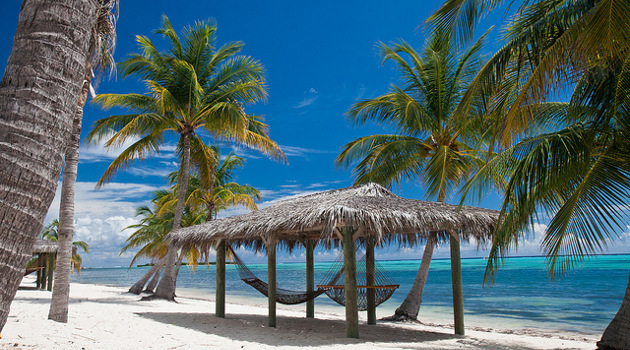Can you identify the nation with the world’s 7th-friendliest tax system according to the Index of Economic Freedom?
Don’t know the answer? Well, here’s a hint. If you don’t count Middle Eastern nations that finance their governments with oil money, this is the nation that is in second place, behind only the Bahamas.
Still don’t know?
Well, don’t be embarrassed because most people have never heard of the place. This tax paradise is an obscure nation in the South Pacific called Vanuatu. Comprised of dozens of islands, Vanuatu is one of the few places in the world that doesn’t have an income tax. No personal income tax (I’m jealous). No corporate income tax (I’m jealous). No capital gains tax (I’m jealous). No death tax (I’m jealous).
Nada. Zero. Zilch.
But the absence of an income tax bothers some outsiders. Nations such as Australia and international bureaucracies such as the World Bank are pressuring politicians in Vanuatu to adopt an income tax. And they’re playing dirty, trying to bribe and extort lawmakers with promises to provide more aid or threats to withdraw existing aid.
Faced with this threat, members of the Vanuatu business community asked me if I would make a big sacrifice and come to their nation so I could explain to politicians and the public why an income tax would be a terrible mistake. Being a noble person and nice guy, I said yes, even though it means I’m having to miss some of the wonderful December weather in Washington, DC.
This is only my second day in Vanuatu, but I’ve already given one speech, done some local media, and met with a bunch of people. Combined with the research I did before arriving, there are two lessons that we can learn from what’s happening.
First, the absence of an income tax does not necessarily mean a country a role model for free markets. If you look at the latest edition of the Index of Economic Freedom, Vanuatu is ranked #89 out of 178 nations, barely qualifying for the “Moderately Free” club of countries. To give you an idea what this means, Vanuatu ranks below Italy and France.
The moral of the story is that it’s good to have a low tax burden and no income tax, but that’s just one piece of the puzzle. Vanuatu gets very low scores in other areas, particularly regulatory efficiency and rule of law.
This is one of the reasons why Vanuatu is still a poor country.
The Bahamas has no income tax, but it also gets decent scores in other areas, so it ranks #31 out of 178 nations. Unsurprisingly, the people of the Bahamas are much more prosperous than their counterparts in Vanuatu.
And if you look at jurisdictions such as Bermuda, Monaco, and the Cayman Islands, they don’t get ranked by the Index of Economic Freedom, but they presumably would be in the top 10 because of their systemic commitment to free markets. And all of those jurisdictions are among the wealthiest places on the planet.
So the bottom line is that Vanuatu has only one good policy, and that’s the absence of an income tax. I’m telling them they need to engage in further economic liberalization. Other outside forces, however, are telling policy makers to get rid of their only attractive economic policy. Go figure.
Second, the reason why the income tax is a threat is that Vanuatu politicians have increased the burden of government spending. There are several source of data, including the IMF’s massive database, and they all show that government spending since 2000 has grown by an average of about 6 percent annually.
 In other words, they’ve been violating my Golden Rule. And when that happens, it just a matter of time before there’s pressure for big tax increases.
In other words, they’ve been violating my Golden Rule. And when that happens, it just a matter of time before there’s pressure for big tax increases.
So in my big public speech last night, I obviously explained why an income tax would be a horrid mistake for Vanuatu, but I also explained that bad tax policy will be inevitable unless there is an effective policy to control the growth of government. And that’s why the last half of my speech was about the merits of a spending cap.
I cited the positive results in nations that have enjoyed multi-year periods of spending restraint, and I specifically highlighted the very effective spending caps in Hong Kong and Switzerland. I even pointed out that international bureaucracies such as the OECD and IMF have admitted that spending caps are the only effective fiscal rule.
The challenge, of course, is that politicians very rarely are willing to tie their own hands. From their perspective, a spending cap is a threat to their ability to play Santa Claus. They’d much prefer, based on “public choice” incentives, to impose a new form of taxation.
But this doesn’t mean the fight against the income tax is hopeless. As I’ve explained when writing about American politicians, lawmakers are often tempted to do the wrong thing. They may frequently surrender to temptation and choose to do the wrong thing. But they’re also capable of doing the right thing.
My job is to be the angel on one shoulder, offering good advice to counter the malignant pressure being imposed by the devil (especially the Australian Tax Office) on the other shoulder.
The United States made a very big mistake back in 1913. Vanuatu should learn from our error.
P.S. This isn’t the first time I’ve waded into a battle over whether a zero-income-tax jurisdiction should impose an income tax. A few years ago, I helped thwart a scheme to impose an income tax in the Cayman Islands. I hope to be similarly successful in helping the people of Vanuatu.
———
Image credit: SF Brit | CC BY-ND 2.0.

